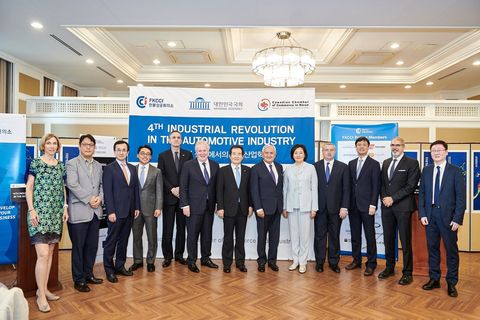Bilans d’évènement Automobile
What future for our mobility? FKCCI forum on the “4th Industrial Revolution in Automobile Industry” at the National Assembly of Korea

FKCCI’s special forum held at the National Assembly's on September 23rd in cooperation with the Canadian Chamber of Commerce in Korea was the opportunity to share ideas between private and public actors from Canada, France and Korea on future driving solutions.
The event provided a meaningful place for debate on how the future automobile industry should move forward, highlighting (1) the institutional approach to autonomous driving, and (2) the experience of companies and universities on the field.
High-level institutional figures, such as Korea’s SMEs and Startups minister (MSS) PARK Young-sun, Canada’s former deputy Prime minister Jean CHAREST, and former French Prime minister Jean-Pierre RAFFARIN agreed that cooperation will be key to achieve progress in autonomous vehicle technology and commercialization. “Cooperation is needed in three ways: with consumers, between private and public actors, and among what I call the club of the 2%”. The club of the 2% highlights the idea that, currently, 98% of the world investment in the 4thIndustrial Revolution are made by the US and China, so the other countries would have no other way than cooperating.
Regarding consumers, “social acceptance will be the key for success”, according to Mr. RAFFARIN. Citing different surveys, about 57% of the Canadian people were supportive for autonomous driving, 41% for France and 31% for the US. Still a long way to go, although 90% of car accidents are caused by human factors. Jean CHAREST, former Québec Premier and Canada Deputy Prime Minister, added that “the whole notion of mobility is changing”, as consumer preferences, tightening regulation, and technological breakthroughs add up to a fundamental shift in individual mobility behavior, flagrant among young generations. "It's an amazing experience to see a car driving on its own, he added, I'm not going to say exactly when I can easily see such self-driving cars on ordinary roads, but I think I can see them in places like Jeju very soon".
As from the Korean perspective, "AI and self-driving areas require small and medium-sized companies to play a key role, which should be based on 'connectivity' and 'cooperation'," said PARK Young-sun, MSS Minister, in a congratulatory speech. "Korea has recently entered a technology evaluation stage to connect a new global supply chain of materials and components. We will need support of more high-tech Canadian and French companies to work with local companies," she added. Mr. CHANG Byung-gyu, Chairman of the Presidential Committee on the 4th Industrial Revolution, Mr. CHUNG Sye-Kyun, Chairman of the France-Korea Friendship Group of the National Assembly, and Mr. LEE Jong Koo, Chairman of the Trade, Industry, Energy, SMEs, and Startups Committee of the National Assembly, also shared their perspective on the development of autonomous driving in Korea.
Beyond the institutional approach, the second part of the forum gave the floor to private actors and universities to assess the current status of autonomous driving applications. “We are ready for applications in close, controlled environments”, said Sophie Schmidtlin, Renault-Nissan Alliance Global Director for Advanced Engineering. Mr. Lee Kyung-su, Professor of Seoul National University, supported the idea citing the recent successful Korean experiment of level 3 autonomous driving test at the Gyeongbu express way, while presenting the ambitious Korean roadmap for future driving solutions.
Sophie Schmidtlin added that Renault Group has ambitious plans to introduce 15 self-driving vehicles that utilize Alliance platforms and 8 pure electric vehicles by 2022 as well as implementing 100% connected services in major markets. Meanwhile, Renault Samsung Motors – Korea’s top four car brand - announced at a French Tech event in February the ongoing "Tangun Project" with the support of the South Korean and French governments. Tangun is a research project that develops a system for low-speed self-driving algorithm, a simpler approach than ordinary self-driving technologies, and is currently being developed along with Hanyang University, LG, and Valeo.
To go further, you can read:
- New Korean regulation on autonomous driving system
- KPMG 2019 Autonomous Vehicles Readiness Index which assesses countries’ preparedness for autonomous vehicles
- McKinsey Automotive Revolution – Perspective towards 2030 Report











